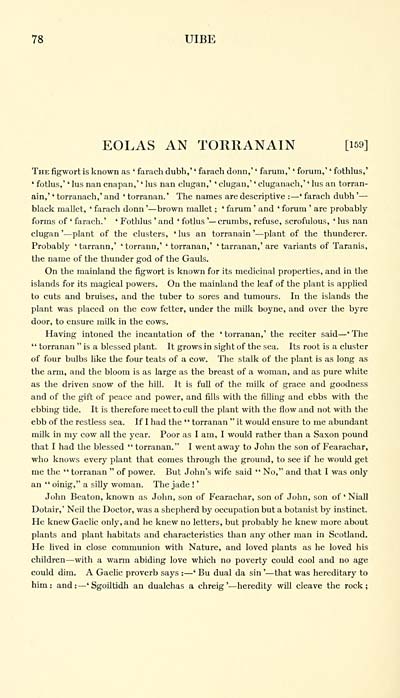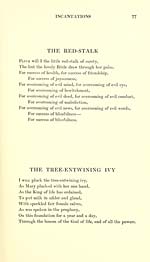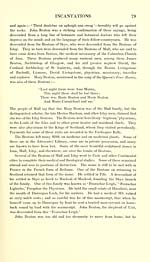Blair Collection > Carmina gadelica > Volume 2
(98)
Download files
Complete book:
Individual page:
Thumbnail gallery: Grid view | List view

78 UIBE
EOLAS AN TORRANAIN [i59]
The figwortis known as ' farach dubh,' ' farach donn,' ' farum,' ' forum," ' fothlus,'
' fotlus,' ' lus nan cnapan,' ' lus nan clugan,' ' clugan,' ' cluganach,' ' lus an torran-
ain,' ' torranach,' and ' torranan. ' The names are descriptive : — ' farach dubh ' —
black mallet, ' farach donn ' — brown mallet ; ' farum ' and ' forum ' are probably
forms of ' farach.' ' Fothlus ' and ' fotlus '—crumbs, refuse, scrofuloas, ' lus nan
clugan ' — plant of the clusters, ' lus an torranain ' — plant of the thunderer.
Probably ' tarrann,' ' torrann,' ' torranan,' ' tarranan,' are variants of Taranis,
the name of the thunder god of the Gauls.
On the mainland the figwort is known for its medicinal properties, and in the
islands for its magical powers. On the mainland the leaf of the plant is applied
to cuts and bruises, and the tuber to sores and tumours. In the islands the
plant was placed on the cow fetter, under the milk boyne, and over the byre
door, to ensure milk in the cows.
Having intoned the incantation of the ' torranan,' the reciter said — ' The
" torranan " is a blessed plant. It grows in sight of the sea. Its root is a cluster
of four bulbs like the four teats of a cow. The stalk of the plant is as long as
the arm, and the bloom is as large as the breast of a woman, and as pure white
as the driven snow of the hill. It is full of the milk of grace and goodness
and of the gift of peace and power, and fills with the filling and ebbs with the
ebbing tide. It is therefore meet to cull the plant with the flow and not with the
ebb of the restless sea. If I had the " torranan " it would ensure to me abundant
milk in my cow all the year. Poor as I am, I would rather than a Saxon pound
that I had the blessed " torranan." I went away to John the son of Fearachar,
who knows every plant that comes through the ground, to see if he would get
me the " torranan " of power. But John's wife said " No," and that I was only
an " oinig," a .silly woman. The jade ! '
John Beaton, known as John, son of Fearachar, son of John, son of ' Niall
Dotair,' Neil the Doctor, was a shepherd by occupation but a botanist by instinct.
He knew Gaelic only, and he knew no letters, but probably he knew more about
plants and plant habitats and characteristics than any other man in Scotland.
He lived in close communion with Nature, and loved plants as he loved his
children — with a warm abiding love which no poverty could cool and no age
could dim. A Gaehc proverb says : — ' Bu dual da sin ' — that was hereditary to
him: and: — ' Sgoiltidh an dualchas a chreig' — heredity will cleave the rock;
EOLAS AN TORRANAIN [i59]
The figwortis known as ' farach dubh,' ' farach donn,' ' farum,' ' forum," ' fothlus,'
' fotlus,' ' lus nan cnapan,' ' lus nan clugan,' ' clugan,' ' cluganach,' ' lus an torran-
ain,' ' torranach,' and ' torranan. ' The names are descriptive : — ' farach dubh ' —
black mallet, ' farach donn ' — brown mallet ; ' farum ' and ' forum ' are probably
forms of ' farach.' ' Fothlus ' and ' fotlus '—crumbs, refuse, scrofuloas, ' lus nan
clugan ' — plant of the clusters, ' lus an torranain ' — plant of the thunderer.
Probably ' tarrann,' ' torrann,' ' torranan,' ' tarranan,' are variants of Taranis,
the name of the thunder god of the Gauls.
On the mainland the figwort is known for its medicinal properties, and in the
islands for its magical powers. On the mainland the leaf of the plant is applied
to cuts and bruises, and the tuber to sores and tumours. In the islands the
plant was placed on the cow fetter, under the milk boyne, and over the byre
door, to ensure milk in the cows.
Having intoned the incantation of the ' torranan,' the reciter said — ' The
" torranan " is a blessed plant. It grows in sight of the sea. Its root is a cluster
of four bulbs like the four teats of a cow. The stalk of the plant is as long as
the arm, and the bloom is as large as the breast of a woman, and as pure white
as the driven snow of the hill. It is full of the milk of grace and goodness
and of the gift of peace and power, and fills with the filling and ebbs with the
ebbing tide. It is therefore meet to cull the plant with the flow and not with the
ebb of the restless sea. If I had the " torranan " it would ensure to me abundant
milk in my cow all the year. Poor as I am, I would rather than a Saxon pound
that I had the blessed " torranan." I went away to John the son of Fearachar,
who knows every plant that comes through the ground, to see if he would get
me the " torranan " of power. But John's wife said " No," and that I was only
an " oinig," a .silly woman. The jade ! '
John Beaton, known as John, son of Fearachar, son of John, son of ' Niall
Dotair,' Neil the Doctor, was a shepherd by occupation but a botanist by instinct.
He knew Gaelic only, and he knew no letters, but probably he knew more about
plants and plant habitats and characteristics than any other man in Scotland.
He lived in close communion with Nature, and loved plants as he loved his
children — with a warm abiding love which no poverty could cool and no age
could dim. A Gaehc proverb says : — ' Bu dual da sin ' — that was hereditary to
him: and: — ' Sgoiltidh an dualchas a chreig' — heredity will cleave the rock;
Set display mode to: Large image | Transcription
Images and transcriptions on this page, including medium image downloads, may be used under the Creative Commons Attribution 4.0 International Licence unless otherwise stated. ![]()
| Early Gaelic Book Collections > Blair Collection > Carmina gadelica > Volume 2 > (98) |
|---|
| Permanent URL | https://digital.nls.uk/75755268 |
|---|
| Shelfmark | Blair.70 |
|---|---|
| Attribution and copyright: |
|
| Description | A selection of books from a collection of more than 500 titles, mostly on religious and literary topics. Also includes some material dealing with other Celtic languages and societies. Collection created towards the end of the 19th century by Lady Evelyn Stewart Murray. |
|---|
| Description | Selected items from five 'Special and Named Printed Collections'. Includes books in Gaelic and other Celtic languages, works about the Gaels, their languages, literature, culture and history. |
|---|

